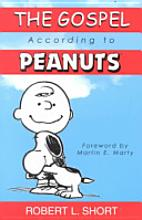Author Finds Scripture in ‘Peanuts’ Strip
He’ll share thoughts on ‘Gospel According to Peanuts’ at Morningside
By Jody Ewing
November 8, 2001
 Copyright Charles Schulz
Copyright Charles Schulz
Author Robert Short uses ‘Peanuts’ cartoons such as this one to demonstrate the presence of religious messages in the popular comic strip.
____________________________________
The Details
Who: Robert Short, author of ‘The Gospel According to Peanuts’
Where: Morningside College
When: Nov. 13, 7 p.m. in the Lincoln Center UPS Auditorium; Nov. 14, 10 a.m. in the Klinger-Neal Theatre
For More Info: Call 712-274-5185
Reading comic strips isn’t just good for a laugh, it’s good for the soul as well. No one knows this better than Robert Short, author of the bestselling “The Gospel According to Peanuts,” America’s No. 1 nonfiction bestseller in 1965, and one of the nation’s top all-time religious bestsellers today.
The book, which uses Charles Schulz’s “Peanut” characters in parables about basic Christian beliefs, continues to break sales records and has been translated into 10 foreign languages. Short, who presents programs throughout the United States and several foreign countries on Christian values found in popular culture, literature and art, will present two lectures at Morningside College on Nov. 13 and 14.
As part of the Morningside College Wright Memorial Lecture series, Short will speak on The Gospel According to Peanuts Tuesday evening and “Calvin and Hobbes and Christ” Wednesday morning. Open to the public, both lectures are free of charge.
“These are probably the two most popular ones I do for college kids, especially Calvin and Hobbes,” said Short, a recently retired ordained Presbyterian minister who now resides in Arkansas. “The programs are an attempt to popularize what I consider to be good theology.”
That’s easy to do, Short says, because in the case of “Peanuts,” the late Schulz did such a good job of intentionally injecting religion into his comic strip. Short attempts to communicate theology in an indirect or parabolic way, using the two comic strips as modern-day parables. The programs include comic strip slide presentations that illustrate scripture from the Bible’s old and new testaments.
“There are just a lot of strips that lend themselves to things that are being said in the Bible in one way or another,” says Short. “Bill Waterson (creator of Calvin & Hobbes) wasn’t in to use of the Bible in explicit ways so much like Schulz could be. Schulz could just quote scripture when he got ready to.”
When one is familiar with the Bible, Short says, they can see the message being spoken in a lot of comic strips.
“Calvin and Hobbes is so realistic about human nature that it’s very easy to talk about the biblical view of human nature,” he says. “Calvin is a mean little kid, and in that way, he represents all of us, because we all tend to be Calvins when it comes right down to it. But at the same time, we love him.”
Short mirrors that message with God’s attitude toward people.
“God doesn’t love us because we’re good, he loves us in spite of the fact that we’re not good, just like we love Calvin in the strip,” he says.
Short stumbled upon the popular slide show idea in 1965 as a 28-year-old pastor working his way through seminary. Using Schulz’s characters to explain the Christian faith, he explained that Lucy, in her headstrong impulsiveness, often represents original sin. Short also depicted how Schulz used Snoopy to stand for Christ or ideal Christians.
Dr. Bruce Forbes, chair of religious studies at Morningside College, says the appeal of Short’s books and presentations is that they’re not preachy and show how religion is often a part of life.
 “For 50 years the Peanuts comic strip had funny things and all the rest, but religion would just come up,” says Forbes. “From other things you’d never guess that religion was a part of life, but for Peanuts it was. It points out that in the everyday things that happen to the characters, religion is part of life.”
“For 50 years the Peanuts comic strip had funny things and all the rest, but religion would just come up,” says Forbes. “From other things you’d never guess that religion was a part of life, but for Peanuts it was. It points out that in the everyday things that happen to the characters, religion is part of life.”
The message is subtle and light, Forbes says, and doesn’t hit people over the head. Instead, scripture is occasionally quoted or characters talk about church. It’s a theme Short calls, “Christianity without doom or gloom” — where eternity isn’t divided into two separate compartments, smoking or non-smoking, where people go either to heaven or hell.
 Robert Short’s book “The Gospel According to Peanuts” was a No. 1 bestseller in 1965.
Robert Short’s book “The Gospel According to Peanuts” was a No. 1 bestseller in 1965.
“When you read the New Testament and take it very seriously and read it carefully, you’ll see that ultimately nobody is going to end up in eternal damnation. Absolutely no one,” Short says.
In addition to Gospel, Short also has written several other highly successful books of popular theology, including The Parables of Peanuts: A Time to be Born and Short Meditations on the Bible and Peanuts, among others. He sees his book and presentations as a way of conveying good theology, which nowadays is in short supply.
“You use these modern day parables as a means of sneaking up on people,” he says. “It’s a form of indirect communication where you say ‘let’s talk about something that you enjoy talking about — namely art in one form or another — or cartoons you enjoy laughing at.’ But let’s use these to talk about what the New Testament is talking about.”
Leave a Reply